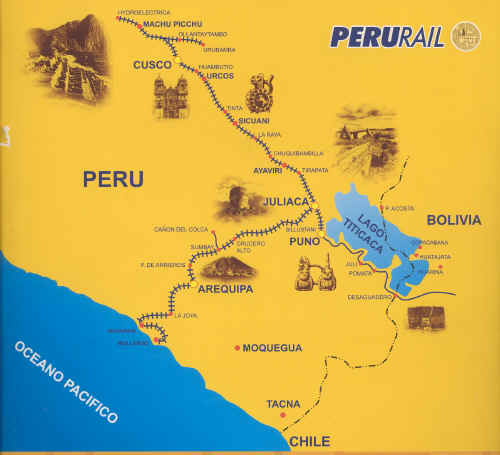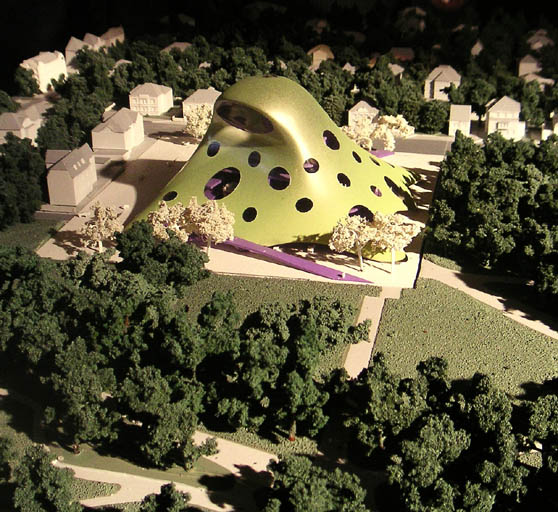sábado, 21 de abril de 2012
viernes, 20 de abril de 2012
La vuelta al mundo en tren (Perú - Andean Explorer)
Ruta (Route): Cuzco - Puno (Lago Titicaca)
Duración (Duration): 10h.
Distancia (Distance): 462 km (287 miles)
La ruta que recorre la distancia entre Cusco y Puno permite descubrir un Perú muy diferente al que representaba la ciudad turística de Cusco. El tren cubre el recorrido en unas 10 horas, y en ningún momento sobrepasará los 35 km/h. Los paisajes que se divisan durante el viaje son espectaculares, ya que el tren se adentra por innumerables valles donde es escoltado ininterrumpidamente por montañas de más de 4000 mtrs. Durante esta marcha cansina predominan los verdes, grandes plantaciones que se benefician del río que corretea paralelo a las vías, y que desembocará en el Titicaca. El precio unitario es de 220$ (166€).
This spectacular rail journey begins in historic Cuzco (Cusco) and travels south to the beautiful city of Puno, on the shores of Lake Titicaca. On the journey, the train makes a gentle climb to higher, and cooler, altitudes. The first half of the journey is dominated by the magnificent Andean mountains which towers over the deep valleys of the meandering Huatanay River. It then reaches the gentler, rolling Andean Plains, where vicuña and alpaca can be seen. If travelling aboard the Andean Explorer, the glass-walled observation car provides the perfect opportunity to view the beautiful scenery. The journey is broken by a scenic stop at La Raya, which is also the highest point on the route. Train Cuzco to Puno - Andean ExplorerTravellers can choose to travel on either the first class carriages of the Andean Explorer or the Backpacker carriages. Train journey between Cuzco (Cusco) and Lake Titicaca (or vice versa), three-course lunch. In additional to the complimentary lunch a Breakfast Menu, along with various snacks and a continuous Restaurant and Bar service is available at an additional cost. Cuzco - from Cuzco (Cusco), the train heads south-east, following the Huatanay River through green fields dotted with willow trees and eucalyptus groves, and passing outlying communities gathered around colonial churches. 25 Km from Cuzco - the train passes through Oropesa, an early-rising community whose forty-seven bakeries have provided Cuzco (Cusco) with its daily bread for generations. 32 Km - before reaching Lake Muina, the train turns to the left, crossing the valley road, to join the Vilcanota River at Huambutio as it plunges sharply into its gorge before widening into the great Urubamba canyon. 40 Km - at Rumicolca, we are close to the great stone gateway of the same name which, for the Incas, silently guarded the southern approach to Cuzco (Cusco). For the much earlier Wari culture it served as an aqueduct, channeling water from the picturesque Laguna de Lucre to their walled city at Pikillacta. 45 Km - the church at Andahuaylillas is one of the jewels in Cuzco’s colonial crown and boasts a magnificent series of murals and superb colonial-era paintings, all on diverse religious themes. 59 Km - at Urcos lies the lake which gives the village its name. Urcos is both a popular spot for weekenders from Cuzco (Cusco) and as local legend suggests, the repository of Inca gold hidden there forever by local chieftains, anxious to prevent the Spanish from melting down their sacred objects. 80 Km - the two villages of Cusipata and Checacupe (at 99 km) hide unexpected treasures of both pre-Columbian and colonial origin, from fine Inca and pre-Inca remains, to yet another ornately-decorated 17th century church. 120 Km - at Raqchi, just before the San Pedro railway station, the remains of the great temple of Viracocha, the creator god, can just be seen to the left of the train. Raqchi has been described by John Hemming as "probably the largest roofed building ever built by the Incas". Seventeen km beyond San Pedro, the train stops at Sicuani, a bustling island of commerce amid a barren landscape. Aymara women ferry their goods around this important market town on nimbly-chauffeured taxi-tricycles, or sit impassively before their wares awaiting a buyer. 186 Km - at Marangani, where an English-style manor house built in the last century is still home to the descendents of the wool barons who established the regions only textile factory there more than one hundred years ago, Cuzco’s fertile hills give way to the high plain known as the Altiplano. The train continues to climb for another 27 Km, past the thermal baths at Aguas Calientes to La Raya, 210 Km from Puno. At 4,321 meters above sea level this is the highest point on the journey, a cold, remote place whose surrounding snow-draped peaks are often shrouded by mist or fine rain, and whose eerie silence is at least partly attributable to eardrums blocked by the dizzying altitude. Crossing this great watershed, the train travels across a sea of seemingly-endless coarse grassland through villages lost to time for all but the Coca Cola company and local breweries. 281 Km - the train reaches Juliaca, a commercial railway-junction town of around 150,000 inhabitants, whose rampant buying and selling seems at times to virtually spill onto the tracks and force the train to pick its way through their stalls. Juliaca is the last stop on this journey through Andean highland culture before reaching Puno (3,855 meters), an expanding, low-roofed university town spread around an austere cathedral, which, since its foundation in 1668, has strengthened its tenuous grip on the shores of Lake Titicaca by gradually scaling the surrounding hills. Journey by train between Cusco and Lake Titicaca (or vice versa), lunch (Starter, main dish, and dessert). It also offers a breakfast menu, sandwiches and a variety of continuous service restaurant and bar at extra cost. * Gourmet Lunch on board, Tea time in the afternoon * Luggage carriage, No extra cost will be charged for your luggage on this route. * Entertainment on board * Stop at the highest point of the route: La Raya
by PI
| Si quieres más/If you want to buy | |
Etiquetas:
Ferrocarril-Railway
jueves, 19 de abril de 2012
Muertes insólitas - Vic Morrow
Vich murió el 23 de julio de 1982, a los 53 años, en el set de la película de "La Dimensión Desconocida" cuando un helicóptero quedó fuera de control por unas explosiones de los efectos especiales, chocó, y lo decapitó con sus aspas. Dos niños actores también murieron en el evento, lo que propició una serie de masivas regulaciones dentro de las leyes de trabajos de niños en Estados Unidos y las regulaciones sobre seguridad en los estudios cinematográficos.
by PI
Etiquetas:
Cosas Curiosas-Curious Things,
Historia-History
Partidos de preparación de España Baloncesto para los Juegos Olímpicos Londres 2012
- 9 de julio de 2012
78 - 74
Polideportivo Pisuerga (Valladolid, España)
- 10 de julio de 2012
Palacio de Deportes de Madrid (Madrid, España)
- 13 de julio de 2012
Pabellón Multiusos Sánchez Paraiso (Salamanca, España)
- 15 de julio de 2012
Palais Omnisports de Paris-Bercy (París, Francia)
- 17 de julio de 2012
75 - 69
Palacio Municipal de los Deportes de Granada (Granada, España)
- 18 de julio de 2012
81 - 75
José María Martín Carpena (Málaga, España)
- 20 de julio de 2012
85 - 105
Coliseum de A Coruña (A Coruña, España)
- 24 de julio de 2012
78 - 100
(Barcelona, España)
by PI
| Si quieres comprarlo/If you want to buy | |||
Etiquetas:
Baloncesto-Basket
Suscribirse a:
Comentarios (Atom)













































